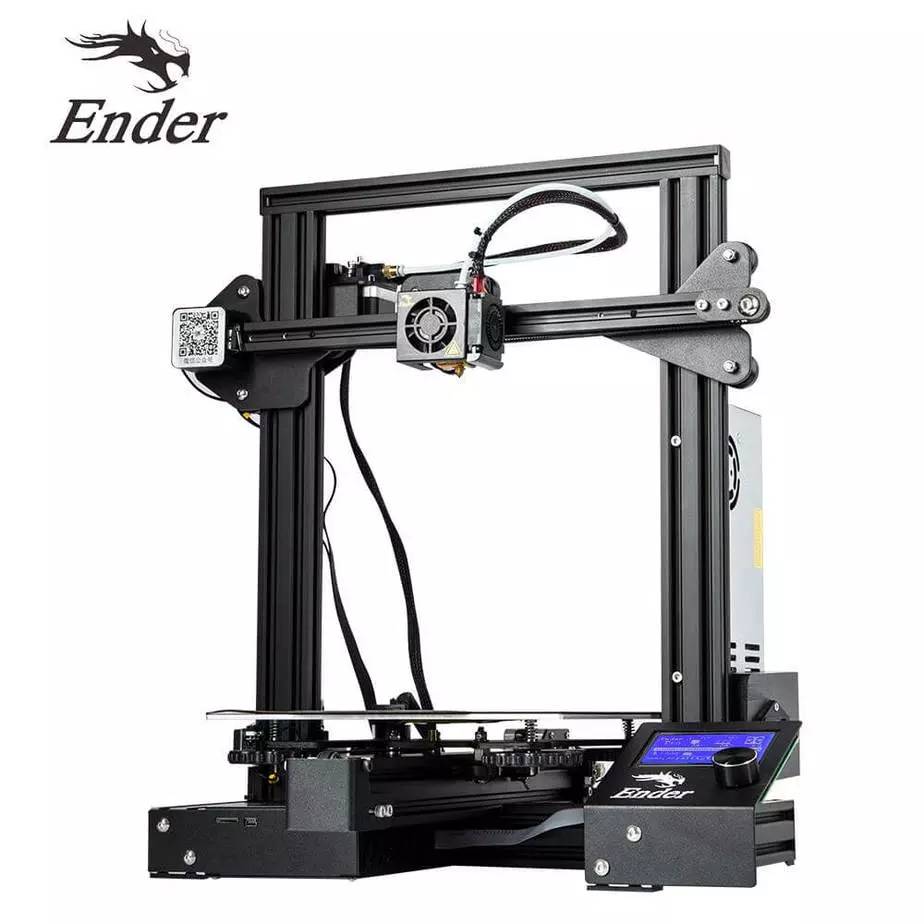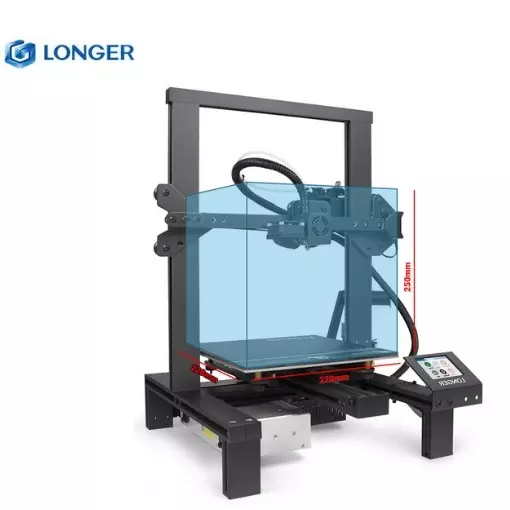Compare Ender 3 PRO vs LK4 X
Comparison between the best 3D printers
Choose the best 3D printer at the best price. The cheapest 3D printers are here.
Buy a 3D printer here with 3D Fila.
 |
 |
|
| Model | Ender 3 PRO[BUY Ender 3 PRO] |
LK4 X |
| Printing Material | Filament | Filament |
| Buy Filament for Creality 3D Ender 3 PRO | Buy Filament forLonger 3D LK4 X | |
| Estimated price | $258,00 | $299,00 |
| Manufacturer | Creality 3D | Longer 3D |
| Release Year | 2019 | 2022 |
| Print Volume [mm] | 220x220x250 | 220x220x250 |
| Printer Size [mm] | 440x440x465 | 465x485x615 |
| Weight [kg] | 6,62 | 9,8 |
| Power Loss Recovery | NO | YES |
| Enclosed printer | NO | NO |
| Bed Leveling | Manual | Automatic |
| Filament End Sensor | NO | YES |
| Bed type | Heated | Heated |
| Power supply system | Bowden | Bowden |
| Standard nozzle | 0,4 | 0,4 |
| Maximum Nozzle Temperature [°C] | 255 | 250 |
| Maximum Bed Temperature [°C] | 110 | 100 |
| Maximum printing speed [mm/s] | 180 | 120 |
| Filament holder | YES | YES |
| Camera for supervision | NO | NO |
| Recommended filaments | PLA, TPU, ABS, PETG | PLA, TPU, ABS, PETG |
| Recommended slicers | Cura, Simplify, Slic3r | Cura, Simplify, Slic3r |
| Maximum Resolution [mm] | 0,1 | 0,1 |
| Processor | 32 bits | 8 bits |
| Display | Mono | Touchscreen TFT 4,3'' |
| Power Supply | 24V / 360W Meanwell | 12V / 320W |
| Connectivity | SD / USB | SD / USB |
| Operating systems | Windows, Mac, Linux | Windows, Mac, Linux |
| Date of registration in the system | 2021-04-14 | 2021-04-15 |
| Release date | 2019 | 2022 |
| Extra features | The Ender 3 Pro stands out for its beginner-friendly assembly and easily modifiable structure. With a 350W power supply, it heats up quickly and has a simple application that offers good print quality. However, its motors and fans are noisy, and the interface seems outdated. Assembly is accessible, without the need for advanced techniques, and it has integrated belt tensioners. It includes a detailed guide and supports microSD card and USB. | Longer LK4 X offers intelligent 16-point auto-leveling and dual direct-gear extruders for precise filament control, compatible with multiple materials. It features an ultra-quiet 32-bit motherboard and open-source firmware, promoting creative freedom. Its PEI film platform ensures strong adhesion and easy model removal. Includes resume printing functions and filament out-of-stock protection. Assembly is simple, with 95% pre-assembled. It has a 4.3-inch touch screen, dual fan kit, low power consumption, manual belt tensioners and improved Teflon tube. |
| Support for multiple colors and materials (AMS and CFS) | NO | NO |
Notes * |
||
| Cost-benefit | 6 / 10 | 7 / 10 |
| Hardware | 0.5 / 10 | 2.8 / 10 |
| Tela | . | . |
| Print volume | 3 / 10 | 3 / 10 |
| Performance | 1 / 10 | 1 / 10 |
| [BUY Ender 3 PRO] |
Conclusion |
| In choosing between the Ender 3 Pro and the Longer LK4 X, several factors come into play that cater to different user needs. The Ender 3 Pro, while being the more affordable option, offers solid performance with its beginner-friendly assembly, modifiable structure, and quick heating capabilities. However, it lacks some modern features like power loss recovery and automatic bed leveling, which may be significant drawbacks for some users. Its straightforward interface and decent print quality make it attractive for beginners and hobbyists, though noise levels and outdated design can be a concern. On the other hand, the Longer LK4 X, although slightly pricier, excels in user convenience and advanced features. With automatic bed leveling, a touchscreen interface, and a dual gear extrusion system, it stands out for its ease of use and precise filament control. The inclusion of power loss recovery and filament end sensors adds to its appeal, especially for more experienced users who appreciate enhanced functionality and reduced risks during printing. While it is bulkier and slightly less efficient in terms of maximum printing speed, its quiet operation and thoughtful features make it a strong contender. Ultimately, if budget is a primary concern and you’re looking for straightforward functionality, the Ender 3 Pro is an excellent choice. Conversely, if you desire modern conveniences and advanced features to enhance your 3D printing experience, the Longer LK4 X justifies its higher price with its superior capabilities. Thus, the best choice largely depends on individual priorities—whether simplicity and cost or advanced features and convenience is more important. |

